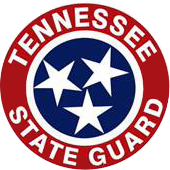Tennessee State Guard
| Tennessee State Guard | |
|---|---|

The Tennessee State Guard insignia
|
|
| Active | 1985 - Present |
| Country |
|
| Allegiance |
|
| Type |
|
| Role | Military reserve force |
| Size | 250+ |
| Part of | Tennessee Military Department |
| Garrison/HQ | Nashville, TN |
| Website | http://www.tnmilitary.org/tennessee-state-guard.html |
| Commanders | |
| Civilian Leadership |
Governor Bill Haslam Governor of the State of Tennessee |
| State Military Leadership |
Major General Terry M. "Max" Haston Commanding General, Tennessee State Guard |
Major General Terry M. "Max" Haston
Adjutant General of the State of Tennessee
The Tennessee State Guard (TNSG) is the state defense force of the state of Tennessee. The TNSG is organized as an all-volunteer military reserve force whose members drill once per month unless called to active duty. The TNSG is a branch of the Tennessee Military Department, alongside the Tennessee Army National Guard, the Tennessee Air National Guard, and the Tennessee Emergency Management Agency. The State Guard acts as a force multiplier for the state's National Guard. As a state defense force, the Tennessee State Guard cannot be federalized, and is not deployed outside the borders of Tennessee, as it is a purely state-level unit. It answers solely to the Governor of Tennessee, unlike the dual federal and state controlled National Guard. The creation of a state military force is recognized under Tennessee Code Annotated 58-1-401.
The Tennessee State Guard traces its origins to the American Revolution. During the Battle of King's Mountain, approximately four hundred volunteers from the area known today as Tennessee crossed the mountains into North Carolina to fight against the British Army and Loyalist militias. They contributed significantly to the Patriot victory.
Tennessee militias served in battle again in the War of 1812 under Andrew Jackson. After fighting and winning the Battle of Horseshoe Bend (1814), they served with distinction in the Battle of New Orleans alongside other state militias, federal soldiers, local volunteers, slaves, and pirates against the British Army.
During the Mexican-American War, the nickname "The Volunteer State" became associated with Tennessee. When asked by President Polk to provide two infantry regiments and one cavalry regiment, Tennessee provided approximately ten times that number of volunteers.
...
Wikipedia
